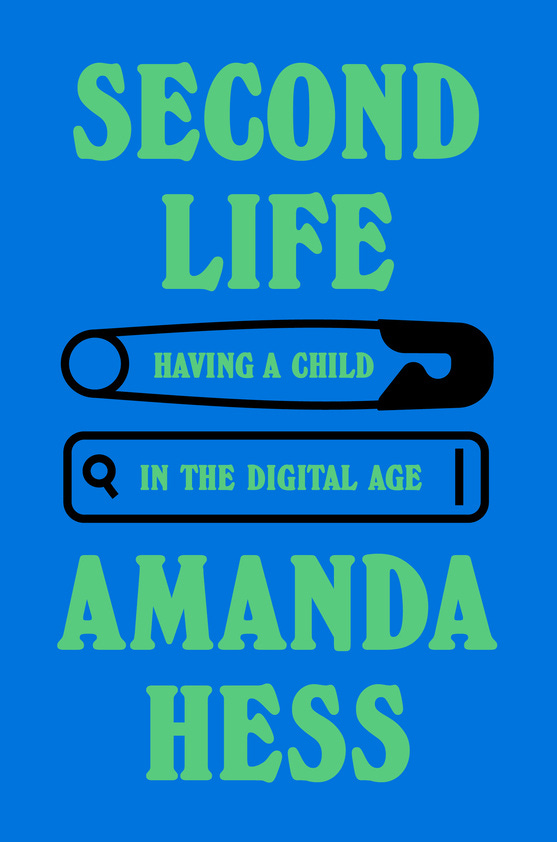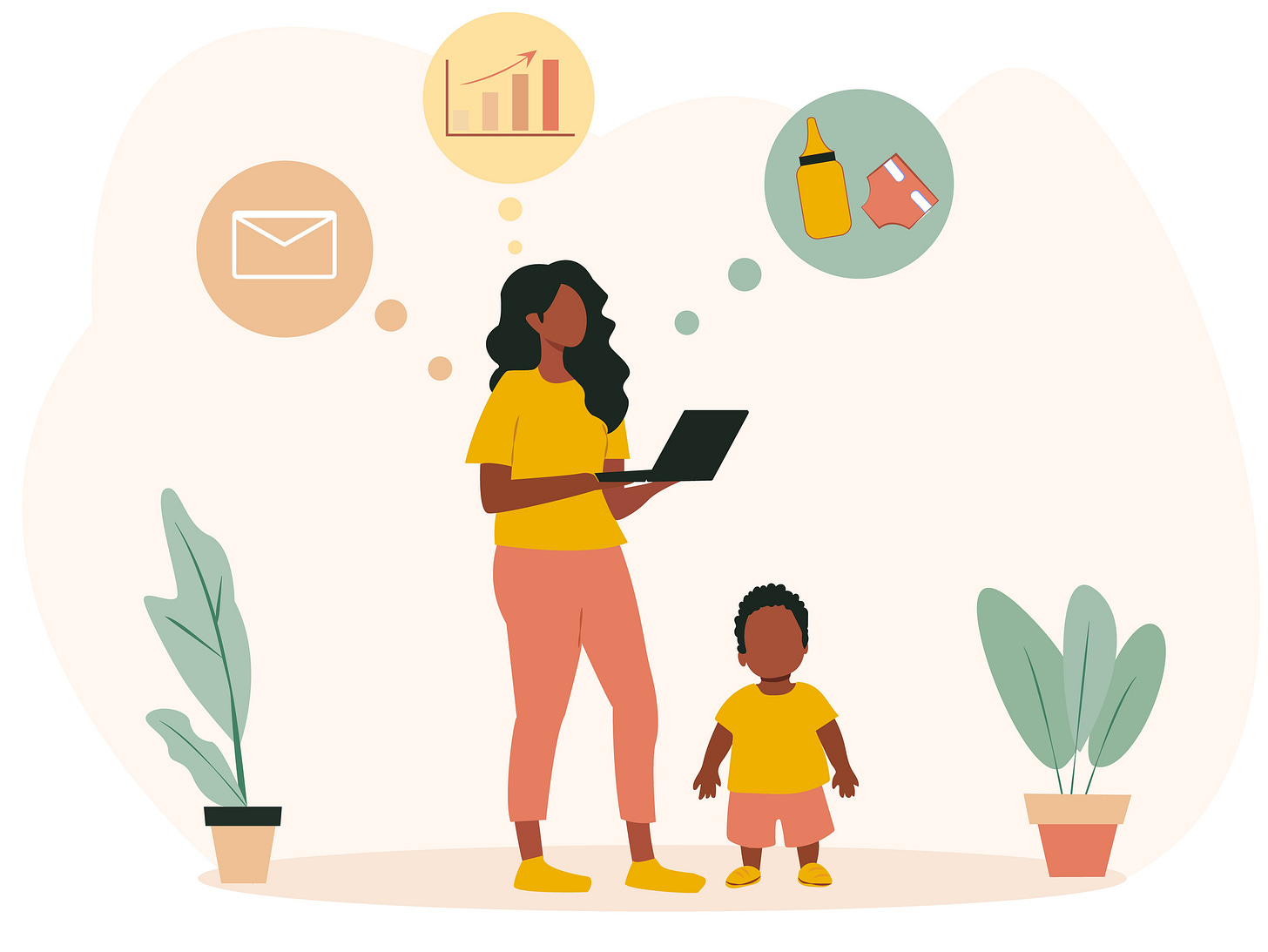Same old fears. Brand new technology.
Exploring the intersection of technology and our bodies
When I pick my kids up from school, my daughter reminds me she needs new suits for the swim team and also we are out of milk; my son reminds me he needs supplies for a school project and a glove for baseball. I ask my daughter to make a note in the notes app and share it with me, in the few minutes between shuttling them to piano, voice, baseball and swim practice. I order groceries online, create a list of everything we need for sports, sync the camp schedules in Google Calendar, and text my ex-husband to remind him of the end-of-the-year talent show.
It has never been easier to be a parent. But it has also never been harder.
Every time there is a technological revolution that eases the burden of housework, cultural standards for mothers become more exacting. Direct improvements to the lives and labor of women correlate with a backlash to their freedoms. Right now, apps, smartphones, and AI-based technology offer new mothers the promise of comfort, ease, and the opportunity to optimize parenting. At the same time, federal and state governments are rolling back reproductive rights, so giving birth has become more dangerous, and increasingly prominent pronatalists are urging women to devote their lives entirely to their children. Meanwhile, the current administration is rolling back the social safety net and cutting funding to programs that feed children and families. Child care remains ridiculously expensive.
This isn’t new. In her book More Work for Mother, historian Ruth Cowan connects technological advances that transformed the lives of women, from the washing machine to the microwave, with expectations that women spend more time on housework and child-rearing. She notes that the early-to-mid 20th century — when postwar wealth lead to an increase in labor-saving devices — also led to stricter expectations regarding how a woman should run her home. In fact, according to Cowan, women in this period ended up doing more housework than ever before. The American housewife of 1950, working alone, created a household that, in 1850, would have taken a staff of servants to manage.
In her new book Second Life, New York Times critic Amanda Hess immerses herself into a brave new world of parenting, one with devices like the SNOO that promise more hours of sleep; baby monitors that offer CIA-level surveillance of your precious little; and reproductive technologies that monitor pregnancies. The book is a memoir that follows Hess through her first pregnancy. But it is also a meditation on what it means to be a modern body: constantly optimized, monitored, tracked, and commodified.
The promise of the techno-surveillance of the pregnant body and the fetus is a promise of control over the uncontrollable — the realities of life and death. But how much can we control? And how much should we know?
Hess is ambivalent about these technologies. On the one hand, she acknowledges that because of technological advances, her son was diagnosed with Beckwith-Wiedemann syndrome, a condition that causes babies to grow a little too fast. On the other hand, the over-reliance on technology was itself a kind of trap, where “consumption becomes the new community.”
In writing about the SNOO, a smart baby bassinet designed and sold by Harvey Karp, the modern guru of sleeping infants, Hess observes, “It seemed to me that Karp had built a business on the bet that his customers did, on some level, desire robot-slaves. After all, the SNOO functioned more like a minion than a surrogate aunt. It was much more affordable than a human night nurse, especially if bought secondhand or rented by the month, but its sleek machinery also obscured the other laborers who made it — the Chinese factory workers who built its body and the call center employees who kept it running.”
Hess also observes that new technologies are still hampered by the old anxieties. The concept of “maternal impressions” is an ancient theory that posits that a pregnant woman who eats the wrong food, sees the wrong image, or experiences the wrong thing can leave a lasting impression on her fetus — damaging, disabling, or destroying it. Hess connects this idea to the book On Monsters and Marvels, in which the 16th-century surgeon Ambroise Paré posits that a woman who stared at an image of a bear would give birth to a very hairy child. It’s a ridiculous notion when put that way.
But in the modern era, where pregnant people are encouraged to eat the right nutrients and consume the right content; to obsessively monitor their intake of everything; and also to spare themselves from anxiety so as not to harm the baby, it’s the same idea as the archaic theory of maternal impressions, just different tech.
The attempt to fend off our darkest fears about the little lives entrusted to us connects the free-birthing parents who eschew technologies and the highly controlled parents who aim to direct and monitor their progeny from the zygote stage onward. But as Hess points out, both movements are capitalism disguised as comfort. Everyone is selling birthing methods, apps, retreats, oils, baby carriers, baby sleepers, baby monitors, organic hemp baby blankets, genetic testing and more.
A good mother pays attention. A good mother monitors. A good mother lets her children be free. A good mother has all the apps. A good mother purges her home of screens. A good mother forbids red dye no. 3 and any weapon-like objects. A good mother serves her children meat. A good mother is vegan. A good mother optimizes, hacks, disrupts and systematize until everything shines.
But when do we cease being mothers who put everything into our children and just get to be humans?
No matter how much we martyr ourselves, our children are not perfect computers. There is no input/output mechanism. And none of what we do can control the uncontrollable or even just repair the intentionally shattered social safety net.
Hess’s book offers a snapshot of a time when technology has offered mothers so much while society is offering less and less. And it reminds us there is no true way to hack or disrupt parenting.
The apps designed to help women and mothers are created by technocrats who support an administration that actively opposes reproductive rights and is defunding research into women’s health. The Instagram influencers promising pain-free, all-natural, organic babies have their own grift too; often, they overlap with RFK Jr.’s “Make America Healthy Again” movement. It is help with a price tag. It’s help that requires individuals to make up for what our governments have systematically taken away — health care, childcare, community, and so much more.
But in the end, it’s still you and your baby. You and your fears. You and the fleshy modern experience of parenting in a world where all our systems are failing, but hey, at least you can get groceries delivered from an app.
You can buy Second Life from your favorite bookstore or Bookshop.org.
I also enjoyed this New Yorker review of the book, where Jessica Winter writes:
Both the ancient dogma of maternal impression and the emerging ethos of Silicon Valley baby-coders offer the promise of control. But parenting is not a programming language, and a child is not an engineering problem or a structure to be built to exact specifications. If that’s what you want, you should design a night club or clone your dog.
And last September, at the start of a new school year, I wrote about the culture of compliance and my refusal to download any more freaking sports apps.
And tomorrow, I will publish a bonus newsletter that features an interview with Amanda!







Oh, I have so many thoughts. Thanks for this one and sharing this book. Looking forward to reading it. It does take a village to raise a child, but the village is on fire, and those who lit the flames got an app to help us pretend it’s not on fire.
I so look forward to this book.
The idea that your fetus, baby, child will respond to a series of correct inputs from pregnancy forward and the guilt as you fail to input correctly—I lived largely on cheese sandwiches with chili crisp and fried clams during my pregnancy—is the most pernicious part of parenthood so far. This is what the researchers, influencers, friends, family, etc would have you believe. This is what you yourself would like to believe because then it would even be possible to do it “right.”
In reality your child is a person, just like you, and barring actual neglect is not going to wildly swing between success or failure because you did or did not let them watch Ms Rachel, or fed them solids instead of purees first. IF ONLY IT WERE THAT EASY.
My kid loves books and people more than toys, so all the wooden Montessori shit in the world isn’t going to do it for him. I had nothing to do with his taste. But what a dream it would be if I could make him healthy, intelligent, thoughtful, kind, just by making sure he always wore soft butch Kate Quinn outfits and never played with anything made of plastic.